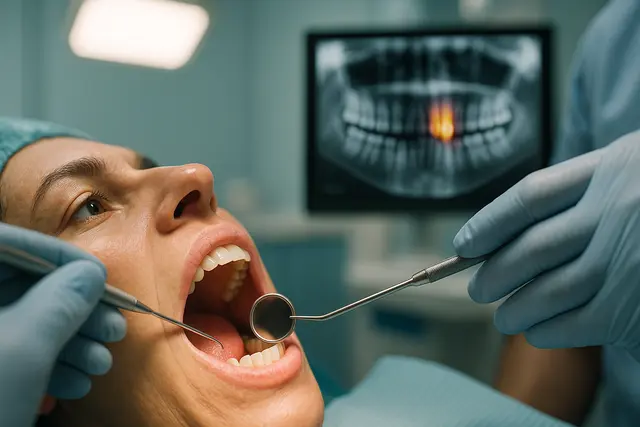Specialized Procedures
How Fast Do Wisdom Teeth Grow? A Guide for Teens and Adults
Wisdom teeth have a reputation for showing up late, and causing a bit of chaos when they do. Whether you're a teen waiting for them to appear or an adult wondering why your jaw suddenly hurts, understanding how fast wisdom teeth grow can help you stay one step ahead of the discomfort.
6 min read
Jul 16, 2025

Let’s talk about those sneaky little latecomers in the back of your mouth, wisdom teeth. These third molars are the last teeth to show up, usually making their grand entrance between the ages of 17 and 25. And while they might sound wise, the timing of their arrival is often anything but convenient.
People have wisdom teeth because, once upon a time, our ancestors needed extra chewing power for their rugged, caveman-style diet. Today, with soft foods and regular dental care, these extra molars are often more trouble than they’re worth.
Wisdom Teeth Are Coming and You’ll Probably Feel It
One day, your mouth feels normal. The next? You wake up with jaw tightness or a dull ache near your ears. Surprise, your wisdom teeth are coming.
When wisdom teeth begin their slow climb through the gums, they can cause swelling, pressure, and even headaches. That discomfort isn’t your imagination. It’s your body’s way of announcing: “Hey, more teeth are on the way!”
When Wisdom Teeth Come in Without Issues (And When They Don’t)
In a perfect world, your wisdom teeth would come in quietly, line up neatly behind your other molars, and cause zero drama. Some lucky people do get erupted wisdom teeth that behave. But for many of us, the reality is impacted wisdom teeth, molars that don’t have enough room to come in, get stuck below the gum line, or grow in sideways.
Impacted wisdom teeth can cause pain, crowd nearby teeth, and lead to infections. If your mouth feels sore or your bite changes, you may have impacted wisdom teeth pressing on surrounding teeth.
Wisdom Teeth Grow at Their Own Weird Pace
So how fast do wisdom teeth grow? That depends. Some teeth begin to emerge quickly, others take their sweet time. Typically, once the eruption of a wisdom tooth starts, it may take a few weeks to several months to fully erupt through the gums. In rare cases, it can take years for a single tooth to fully settle into place.
There’s no set timeline for wisdom growth. One tooth may pop up faster than the others. Some wisdom teeth don’t grow in at all. Others partially erupt and stop. If you’ve got one foot in adulthood and still no sign of those molars, don’t worry, it’s not unusual.
How Long Does It Take for Wisdom Teeth to Fully Erupt?
Once a wisdom tooth begins to break through the gum line, it may take a few months for it to fully erupt. But “fully erupt” doesn’t just mean peeking out, it means the tooth reaches its proper position and stops causing chaos.
Still waiting? That tooth may be playing hide-and-seek. It takes for a wisdom tooth to fully erupt anywhere from several months to over a year, especially if there’s not enough room for wisdom teeth in your jaw.
Signs That Your Wisdom Teeth Are Starting to Erupt
Wondering if your wisdom teeth are beginning their journey? Look for these common signs your wisdom teeth might be on the move:
Tenderness or swelling in the back of your mouth
Pressure near your jaw or ears
Trouble chewing or opening your mouth wide
Bad breath or a weird taste (thanks, bacteria)
If you’re experiencing wisdom tooth pain that doesn’t go away, or worsens, it’s time to talk to a dentist. These teeth don’t follow polite schedules.
What Age Do Wisdom Teeth Typically Start to Grow?
Most people notice wisdom teeth between the late teen years or early twenties. That’s why your dentist might start taking X-rays around age 16 to spot any early signs of wisdom teeth growth.
If you’re wondering what age do wisdom teeth grow, remember this: they usually appear between 17 and 25, but not always. Some folks get them earlier, some much later, and some never get them at all. Weird but true.
Your mouth is a busy place. If there’s not enough room for wisdom teeth to come in straight, they can twist, tilt, or wedge themselves into awkward angles. This not only causes pain, it can damage nearby teeth or gums.
If you don’t have enough room for wisdom teeth, you might end up with infections, cysts, or pressure that leads to tooth decay in your other molars. That’s why regular dental visits matter, your dentist can spot these issues before they turn into full-blown problems.
When Do Wisdom Teeth Need to Be Removed?
Impacted wisdom teeth don’t just hurt. They can also affect your bite, shift your adult teeth, and cause damage to nearby teeth. Worse, impacted wisdom teeth can cause pain that radiates into your jaw, neck, or even your sinuses.
Infected or inflamed impacted wisdom teeth may need to be removed before they cause more serious oral health problems.
Not everyone needs their wisdom teeth removed. If your teeth erupt cleanly, align properly, and don’t crowd your other molars, congrats, you may get to keep them. But let’s be real: that’s not common.
Wisdom teeth need to be removed if they:
Are impacted or only partially erupted
Cause persistent pain or pressure
Lead to infections or gum disease
Press against surrounding teeth
If you need your wisdom teeth removed, don’t stress. Wisdom tooth extraction is usually a quick and safe procedure. And no, you won’t be chewing steak that night, but you’ll be glad you avoided long-term issues.
Wisdom Teeth Removal Can Protect Your Oral Health
Let’s say you have erupted wisdom teeth, but they’re hard to reach and clean. That can lead to plaque buildup, gum problems, and even tooth decay. Wisdom teeth don’t always show their bad side right away, which is why regular dental visits are key.
Wisdom teeth removal can protect your oral health long term, even if the teeth aren’t currently causing problems. It’s better to act early than wait for tooth pain to ruin your weekend.
Wisdom teeth grow slowly. From the first signs of movement to full eruption, it might take months or even years. Some teeth get stuck partway. Others show up fast and furious.
If you’re wondering how long do wisdom teeth take, there’s no exact answer. Every mouth is different, and so is every wisdom tooth. But your dentist can give you a timeline based on X-rays and exams.
What to Expect With Tooth Extraction
If it turns out your wisdom teeth need to go, you’ll likely be scheduled for a wisdom tooth extraction. This sounds scarier than it is. With today’s dental technology, you’ll be numbed up and comfortable during the process, unlike the experience of a root canal without anesthesia, which is significantly more intense.
Tooth extraction recovery usually takes a few days, with soft foods, rest, and maybe a little Netflix. It’s worth it to avoid chronic pain, infections, and damage to nearby teeth.
Wisdom Tooth Emergence Isn’t Always Predictable
One of the most frustrating parts of wisdom teeth is how unpredictable they can be. You might get four teeth, one tooth, or none. You could have erupted wisdom molars on top and impacted ones on the bottom. Or maybe your wisdom tooth is growing sideways like it’s got a mind of its own.
The eruption of wisdom teeth doesn’t always follow a tidy timeline, so don’t assume all four wisdom teeth come in at once, or even at all.
Keep Up With Regular Dental Care to Stay Ahead
Stick to regular dental visits, even if nothing seems wrong. Your dentist can monitor wisdom teeth growth, check for any signs of impaction, and decide if you need wisdom teeth removed early on.
That way, you’ll avoid surprises like an infected wisdom tooth just before a big event. Staying ahead of the game means protecting your smile and keeping your mouth pain-free.
Wisdom teeth are often unpredictable, occasionally painful, and always a little mysterious. But with the right care, good info, and a trustworthy dentist, you can handle whatever those third molars throw your way, whether they erupt gracefully or need a little help
What Age Do Wisdom Teeth Typically Start to Grow?
Wisdom teeth usually begin to grow between the ages of 17 and 25, though the timing varies for everyone. Some people develop them earlier or later, and others never get them at all. Your dentist will often monitor your X-rays starting in the teen years to track their progress and detect potential issues early.
How Can You Tell If Your Wisdom Teeth Are Coming In?
Common signs of wisdom teeth eruption include jaw stiffness, swelling at the back of the mouth, tenderness near the ears, and pressure or discomfort when chewing. Some people also notice bad breath or a strange taste due to trapped bacteria. If these symptoms persist, a dental exam can confirm whether your wisdom teeth are the cause.
When Do Wisdom Teeth Need to Be Removed?
Wisdom teeth should be removed if they’re impacted, causing crowding, triggering pain, or leading to infections. Not all wisdom teeth need removal—some grow in properly without causing problems. However, regular dental checkups are essential to spot potential complications before they worsen.
How Long Does It Take for Wisdom Teeth to Fully Erupt?
Once they begin to emerge, wisdom teeth can take several months to a year or more to fully erupt. The process depends on space in your jaw and the tooth’s angle. Some teeth only partially erupt or become impacted, requiring monitoring or removal to protect surrounding teeth and gums.
Read Next
Related Posts

Specialized Procedures
When Does Wisdom Tooth Pain Stop? Managing Pain Until It Heals
Wisdom tooth pain can range from a mild ache to a throbbing discomfort that makes everyday tasks difficult. Understanding why it happens, how long it lasts, and the best ways to manage it can help you stay comfortable and protect your oral health.
4 min read
Aug 14, 2025

Specialized Procedures
Emergency Wisdom Tooth Removal Cost: Insurance vs. Out of Pocket
Wisdom tooth pain can strike suddenly, leaving you scrambling for relief and worried about the cost. Whether covered by insurance or paid out of pocket, the price of emergency removal depends on several factors, including the procedure type, provider, and location.
5 min read
Aug 10, 2025

Specialized Procedures
How Often Do Root Canals Fail? What Every Patient Should Know
Root canals are a common dental procedure designed to save infected teeth, but like any treatment, they’re not immune to complications. Understanding how often root canals fail and the reasons behind it can help you take the right steps to protect your oral health.
6 min read
Aug 10, 2025
Don’t have time to research every dentist around you?
See why 30k+ patients trusted us